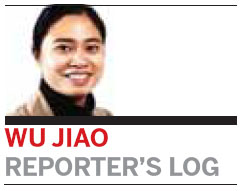 Large Medium Small
Large Medium SmallI have to say before I begin this journal that what I am going to write is not sexist.
But as I cover China's all-important political gala as the annual two sessions for the eighth time, I can see that female reporters have an advantage when making even the most reserved people open up.
The reasons are many. First, we have to acknowledge that the number of female reporters greatly outnumber their male counterparts in China, as more women major in liberal arts.
But women's characteristics of being soft, fearless and careful play a role in helping them stand out.
Compared with male reporters, female reporters are softer in their approach, even when they prepare to raise very sharp questions. Sometimes the women even dare to ask "silly" questions.
More often than not, the interviewees, seeing female reporters who are probably their daughters' age struggling in a sea of people to conduct an interview, will feel sorry for them.
For instance, the two times my glasses were knocked off my face when I was squeezed among many reporters and I was hit in the face with a video camera, the interviewee in both instances saw what had happened and asked me what my question was.
Of the many wonderful interviews I have observed conducted by my female colleagues, the conversation usually begins with a daily greeting.

For instance, a spokesman made headlines in this year's two sessions while commenting in an ambiguous way on a rumored case concerning a senior politician. He definitely was determined to shy away from the media the next day, walking quickly when he appeared again in public. But a considerate question from a female reporter on a day that Beijing had heavy air pollution - "Are you wearing a face mask today?" - made him stop.
As soon as he paused, the follow-up question was, "How do you feel about being a newsmaker?"
The advantage of being a female reporter is also most apparent whenever there are news conferences.
The female reporters have the skills to win the attention of the interviewee by either wearing bright clothes or making frequent eye contact.
Of course, the male reporters have developed countermeasures in recent years. For instance, a Japanese reporter this year shaved "PM2.5" into his hair.
While many of my male counterparts complain about the disadvantage they have against female reporters, I think that what a People's Daily male reporter wrote this year in his journal about his observations of his male counterparts offers some insights into why we female reporters are more successful.
The reporter wrote that when he attended a group discussion with a room of strangers - CPPCC members from different sectors - a China Daily reporter nearby had a thick packet of background information with information about all the group's attendees, with their pictures as well as a dozen formal interview requests prepared for many of those CPPCC members.
He also noted that another female reporter from another media outlet had stored all her questions on her cellphone so that she could produce them anytime she wanted.
It is fair to say that it is impossible for a reporter to know every NPC deputy or CPPCC member, but it is also a fact that more often than not, of the many reporters who approached me to ask who those deputies or members were, the number of males greatly outnumbered the females.
So, as a female reporter myself, while I have always used the tactics of "chatting up" and "wearing warm colors," I think that being careful and winning over interviewees with your caution and respect are the reasons why females sometimes impress their interviewees.
In a typical moment, Cheng Yonghua, the Chinese ambassador to Japan who is also a CPPCC member, talked with reporters for almost an hour on March 4, always with sincerity and frankness.
Some female reporters were so moved by his earnestness that one reporter got a bottle of mineral water from the hotel and insisted that Cheng have a drink before continuing.
So, male counterparts, the next time you are determined to win an interview, start with trivial, small questions or actions.
If that doesn't work, you still can play the background-check card. Finding any connections between you and your interviewee, including being a fellow university alumnus or being from the same hometown, will certainly help you get attention.
If that still doesn't work, please do not lose confidence because you can bring your advantage of being tall and strong to the fore, blocking an entrance and making the interviewee speak before passing.
This is my sincere advice to you, culled from my years of observation of all my male counterparts succeeding in their interviews.
Contact the writer at [email protected]